�
Verilog:
Frequently
Asked
Questions
Shivakumar Chonnad
Needamangalam Balachander
Verilog:
Frequently
Asked
Questions
Language, Applications and
Extensions
Springer
�
eBook ISBN:
Print ISBN:
0-387-22899-3
0-387-22834-9
©2004 Springer Science + Business Media, Inc.
Print ©2004 Springer Science + Business Media, Inc.
Boston
All rights reserved
No part of this eBook may be reproduced or transmitted in any form or by any means, electronic,
mechanical, recording, or otherwise, without written consent from the Publisher
Created in the United States of America
Visit Springer's eBookstore at:
and the Springer Global Website Online at:
http://www.ebooks.kluweronline.com
http://www.springeronline.com
�
To our wives, Manjula Chonnad
and jayanthi Balachander
To our children, Akshata Chonnad,
Puja Balachander, and Manya Balachander
�
Contents
Dedication
Contributing Authors
Foreword
Preface
Acknowledgments
1
BASIC VERILOG
1.1 Assignments
1.1.1
1.1.2
1.1.3
1.1.4
What are the differences between continuous and procedural
assignments?
What are the differences between assignments in initial and
always constructs?
What are the differences between blocking and nonblocking
assignments?
How can I model a bi-directional net with assignments
influencing both source and destination?
v
xvii
xix
xxi
xxvii
1
1
1
2
3
4
�
viii
1.2
1.2.1
1.2.2
1.2.3
1.2.4
1.2.5
1.2.6
Verilog FAQs : Language, Extensions and Applications
Tasks and Functions
5
5
What are the differences between a task and a function?
Are tasks and functions re-entrant, and how are they different
from static task and function calls? Illustrate with an
6
example
9
How can I override variables in an automatic task?
10
What are the restrictions of using automatic tasks?
How can I call a function like a task, that is, not have a return
11
value assigned to a variable?
12
What are the rules governing usage of a Verilog function?
1.3
Parameters
13
1.3.1
1.3.2
1.3.3
1.3.4
1.3.5
1.3.6
1.3.7
13
17
How can I override a module’s parameter values during
instantiation?
What are the rules governing parameter assignments?
How do I prevent selected parameters of a module from
being overridden during instantiation?
What are the differences between using ‘define, and using
19
either parameter or defparam for specifying variables?
What are the pros and cons of specifying the parameters using
the defparam construct vs. specifying during instantiation?
20
What is the difference between the specparam and parameter
21
constructs?
What are derived parameters? When are derived parameters
useful, and what are their limitations?
21
18
1.4
Ports
22
1.4.1
1.4.2
1.4.3
1.4.4
1.4.5
1.4.6
What are the different approaches of connecting ports in a
22
hierarchical design? What are the pros and cons of each?
Can there be full or partial no-connects to a multi-bit port of a
module during its instantiation?
28
What happens to the logic after synthesis, that is driving an
unconnected output port that is left open (that is, no-
connect) during its module instantiation?
What value is sampled by the logic from an input port that is
left open (that is, no-connect) during its module
instantiation?
How is the connectivity established in Verilog when
connecting wires of different widths?
33
Can I use a Verilog function to define the width of a multi-bit
port, wire, or reg type?
33
29
31
�
2
RTL DESIGN
2.1
Assignments
ix
35
35
2.1.1
2.1.2
2.1.3
2.1.4
2.1.5
35
36
What logic is inferred when there are multiple assign
statements targeting the same wire?
What do conditional assignments get inferred into?
What is the logic that gets synthesized when conditional
operators in a single continuous assignment are nested?
36
What value is inferred when multiple procedural assignments
made to the same reg variable in an always block?
37
Why should a nonblocking assignment be used for sequential
logic, and what would happen if a blocking assignment were
used? Compare it with the same code in a combinatorial
block.
39
2.2
Tasks and Functions
42
2.2.1
2.2.2
2.2.3
2.2.4
2.2.5
What does the logic in a function get synthesized into? What
are the area and timing implications of calling functions in
RTL?
What are a few important considerations while writing a
Verilog function?
What does the logic in a task get synthesized into? Explain
with an example
48
What are the differences between using a task, and defining a
module for implementing reusable logic?
50
Can tasks and functions be declared external to the scope of
module-endmodule?
42
44
50
2.3
Storage Elements
51
51
55
2.3.1
2.3.2
2.3.3
2.3.4
2.3.5
Summary of RTL templates for different flip-flops types
Summary of RTL templates for different Latch types
What are the considerations to be taken choosing between
flop-flops vs. latches in a design?
Which one is better, asynchronous or synchronous reset for
the storage elements?
61
What logic gets synthesized when I use an integer instead of a
reg variable as a storage element? Is use of integer
recommended?
59
62
2.4
Flow-control Constructs
63
2.4.1
2.4.2
How do I choose between a case statement and a multi-way
if-else statement?
How do I avoid a priority encoder in an if-else tree?
63
64
�
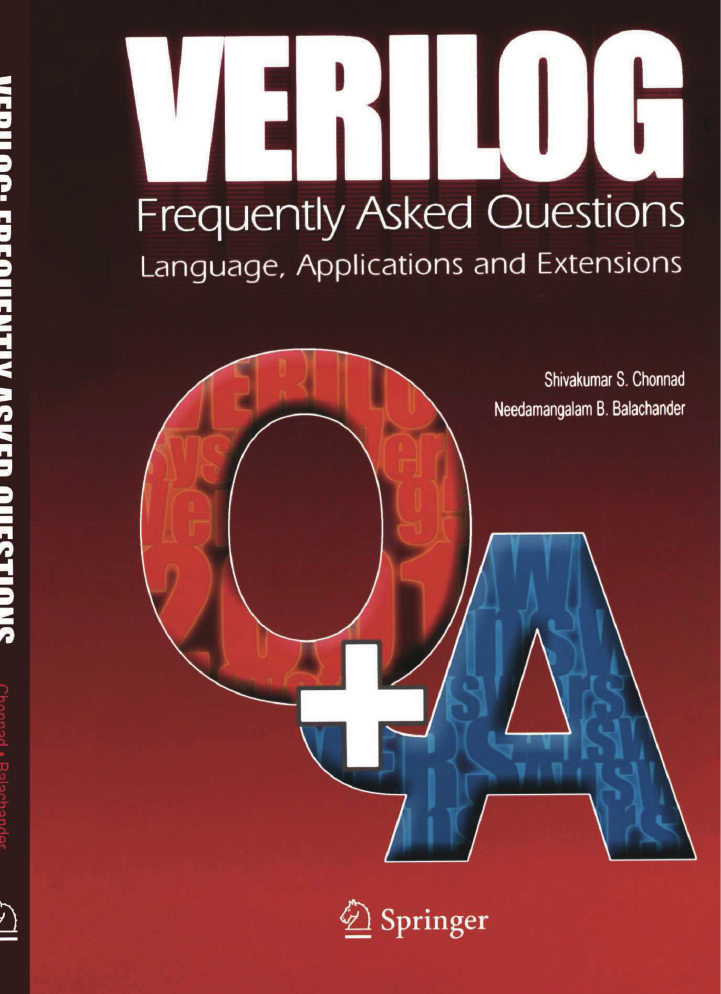

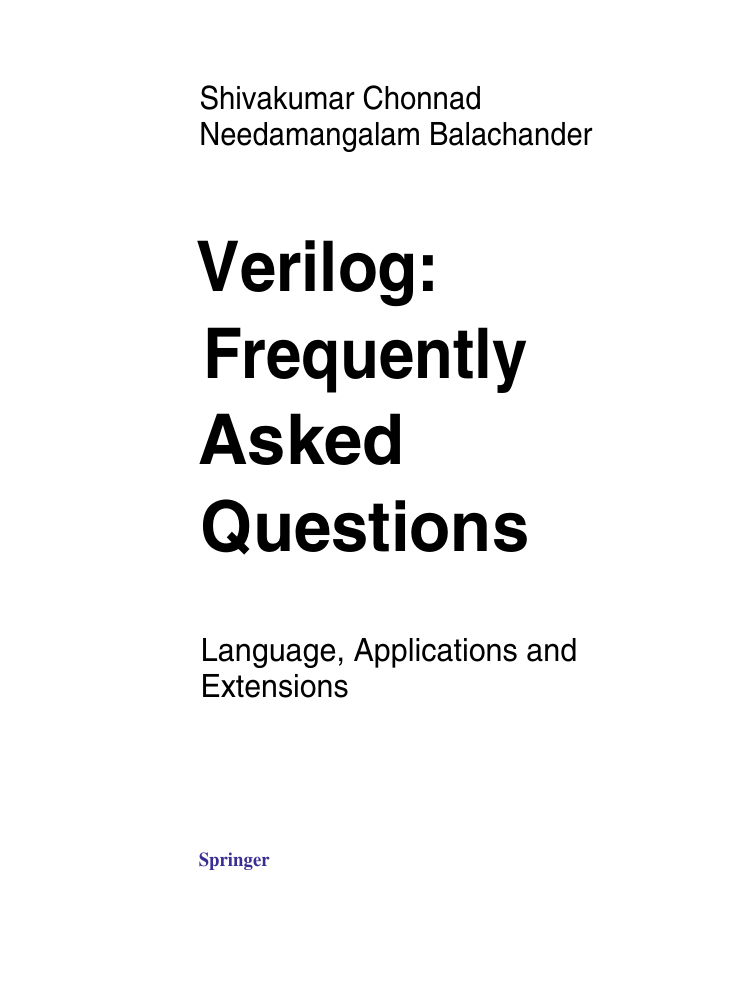


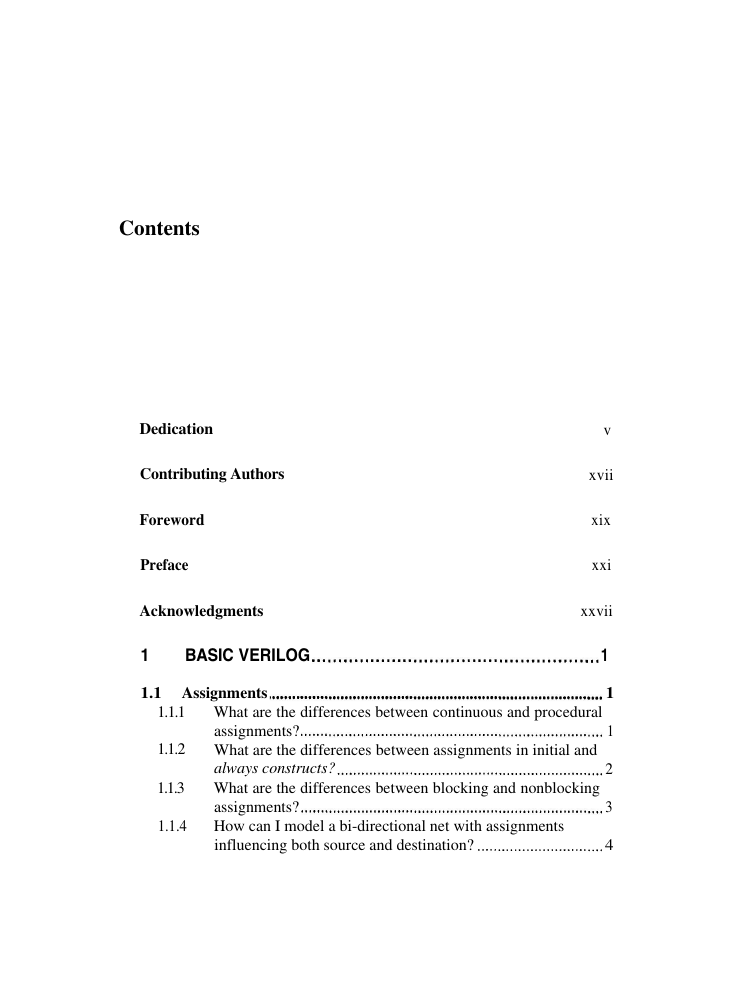
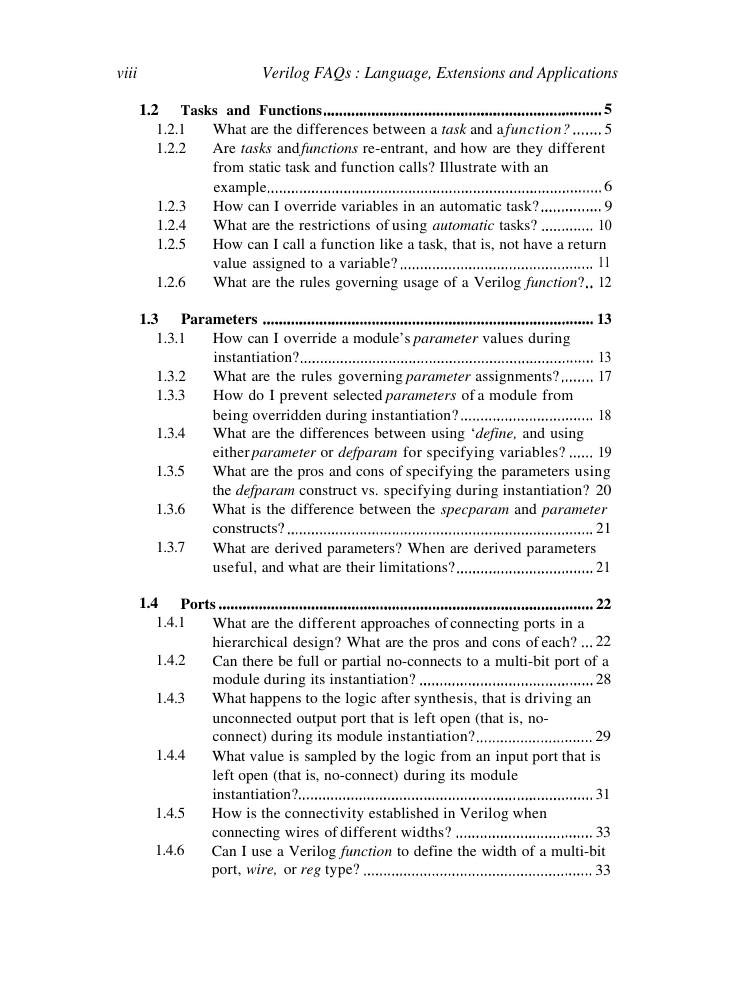
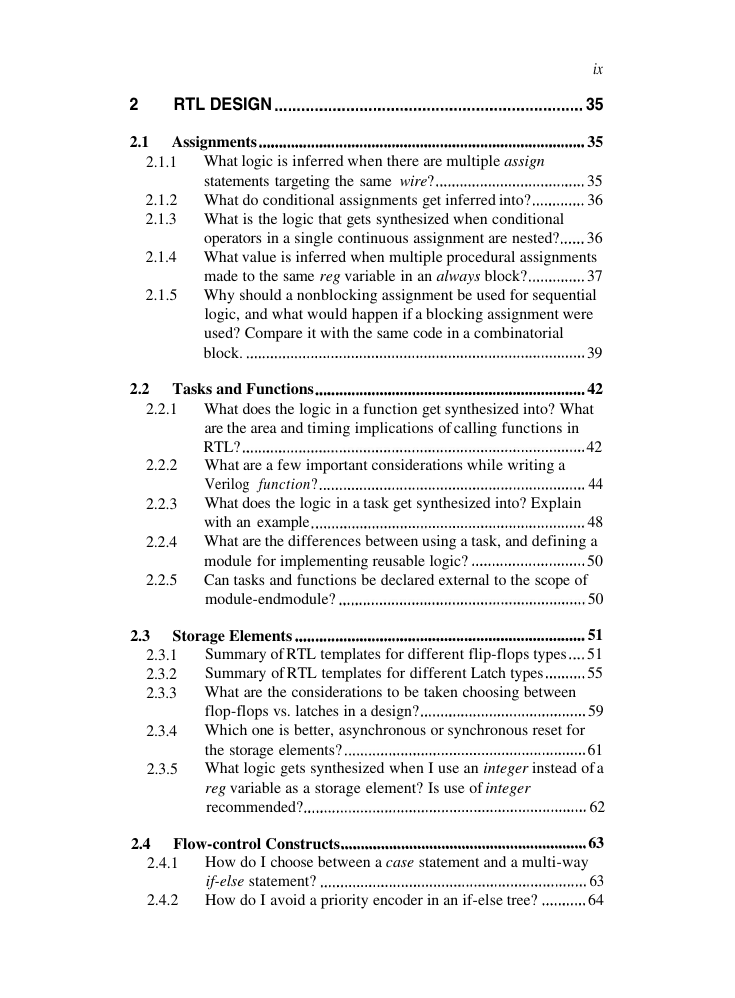








 2023年江西萍乡中考道德与法治真题及答案.doc
2023年江西萍乡中考道德与法治真题及答案.doc 2012年重庆南川中考生物真题及答案.doc
2012年重庆南川中考生物真题及答案.doc 2013年江西师范大学地理学综合及文艺理论基础考研真题.doc
2013年江西师范大学地理学综合及文艺理论基础考研真题.doc 2020年四川甘孜小升初语文真题及答案I卷.doc
2020年四川甘孜小升初语文真题及答案I卷.doc 2020年注册岩土工程师专业基础考试真题及答案.doc
2020年注册岩土工程师专业基础考试真题及答案.doc 2023-2024学年福建省厦门市九年级上学期数学月考试题及答案.doc
2023-2024学年福建省厦门市九年级上学期数学月考试题及答案.doc 2021-2022学年辽宁省沈阳市大东区九年级上学期语文期末试题及答案.doc
2021-2022学年辽宁省沈阳市大东区九年级上学期语文期末试题及答案.doc 2022-2023学年北京东城区初三第一学期物理期末试卷及答案.doc
2022-2023学年北京东城区初三第一学期物理期末试卷及答案.doc 2018上半年江西教师资格初中地理学科知识与教学能力真题及答案.doc
2018上半年江西教师资格初中地理学科知识与教学能力真题及答案.doc 2012年河北国家公务员申论考试真题及答案-省级.doc
2012年河北国家公务员申论考试真题及答案-省级.doc 2020-2021学年江苏省扬州市江都区邵樊片九年级上学期数学第一次质量检测试题及答案.doc
2020-2021学年江苏省扬州市江都区邵樊片九年级上学期数学第一次质量检测试题及答案.doc 2022下半年黑龙江教师资格证中学综合素质真题及答案.doc
2022下半年黑龙江教师资格证中学综合素质真题及答案.doc